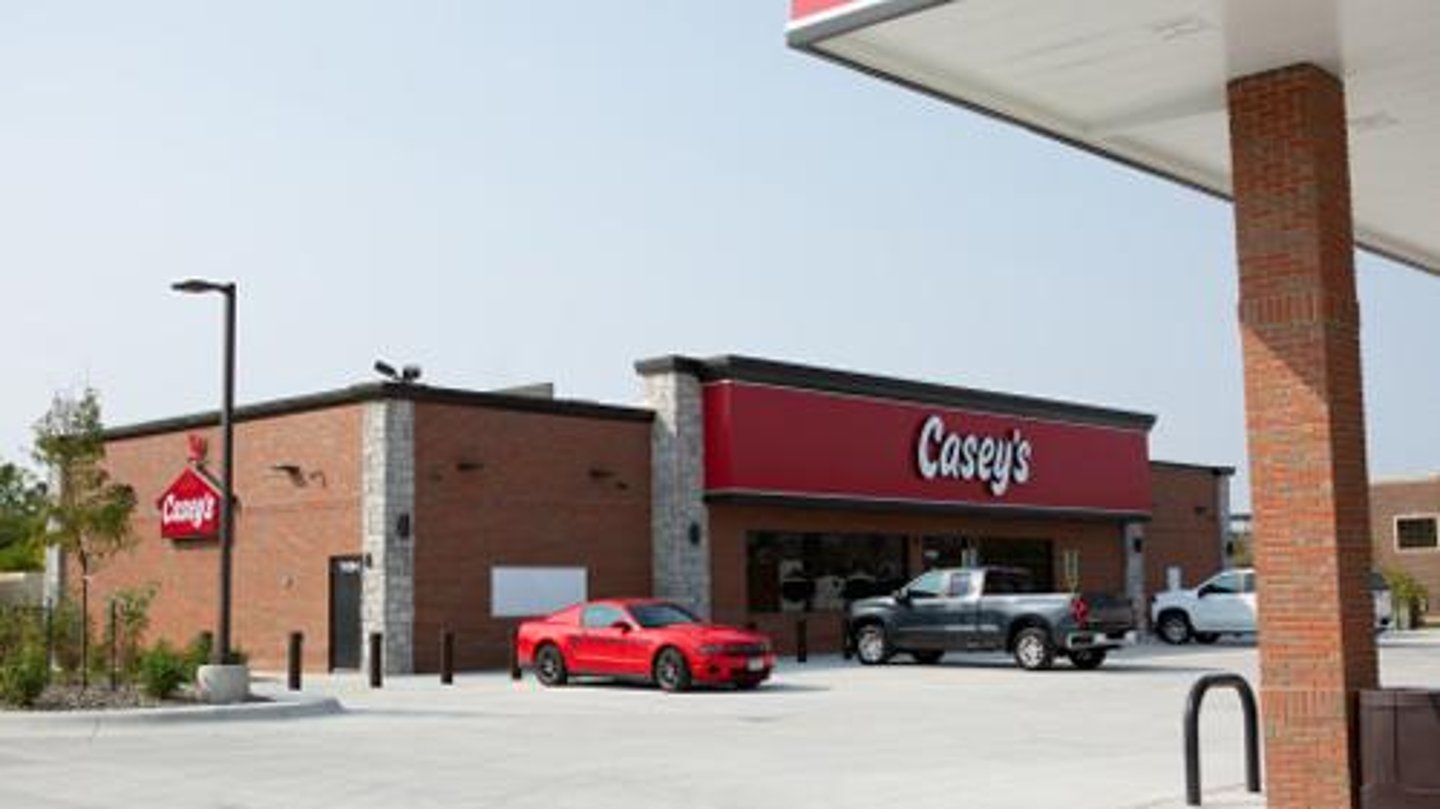Casey's General Stores, Inc. (NASDAQ:CASY) Quarterly Earnings Preview

- Casey's General Stores, Inc. (NASDAQ:CASY) is expected to report an EPS of $1.93 and revenue of approximately $3.95 billion for the upcoming quarter.
- The company anticipates a revenue growth of 10.3% to $3.95 billion, despite an expected decline in EPS by 17.5% due to higher costs and adverse weather conditions.
- Casey's financial metrics reveal a P/E ratio of approximately 31.09, a debt-to-equity ratio of 0.91, and an earnings yield of about 3.22%, indicating its financial health and market valuation.
Casey's General Stores, Inc. (NASDAQ:CASY) is a renowned convenience store chain in the United States, known for offering a wide range of products including prepared food, beverages, and general merchandise. The company is gearing up to release its quarterly earnings on June 9, 2025. Analysts have set the earnings per share (EPS) expectation at $1.93, with projected revenue of approximately $3.95 billion.
Despite the anticipated revenue growth of 10.3% to $3.95 billion, Casey's EPS is expected to see a decline of 17.5% compared to the same period last year. This downturn is attributed to higher costs stemming from the Fikes acquisition, adverse weather conditions, and the absence of a leap day benefit. The stability in the EPS estimate over the past 30 days suggests that analysts have not adjusted their projections, which could influence investor behavior and short-term stock price movements.
Casey's robust revenue growth is largely driven by strong in-store sales, particularly in prepared food, beverages, and general merchandise, expected to see double-digit percentage gains. However, the company's financial metrics reveal some challenges. The price-to-earnings (P/E) ratio is approximately 31.09, indicating how the market values the company's earnings. The price-to-sales ratio is about 1.07, reflecting the company's market value relative to its revenue.
The enterprise value to sales ratio stands at around 1.25, showing the company's total valuation compared to its sales. Additionally, the enterprise value to operating cash flow ratio is approximately 18.52, indicating the company's valuation in relation to its cash flow from operations. The earnings yield is about 3.22%, representing the return on investment for shareholders.
Casey's debt-to-equity ratio is approximately 0.91, indicating a moderate level of leverage. The current ratio is around 0.92, suggesting the company's ability to cover its short-term liabilities with its short-term assets. These financial metrics provide insight into Casey's financial health and market valuation as it prepares to release its earnings report.
| Symbol | Price | %chg |
|---|---|---|
| BELI.JK | 368 | -0.54 |
| BUKA.JK | 195 | 4.62 |
| MAPA.JK | 545 | -0.92 |
| ACES.JK | 428 | -1.4 |

Casey's General Stores (NASDAQ:CASY) Stock Analysis
- Kelly Bania from BMO Capital set a price target of $540 for CASY, slightly below its trading price, suggesting a potential overvaluation.
- Jim Cramer highlighted positive investor sentiment following Casey's Q1 results, with the stock price increasing to $545.93.
- The stock has shown significant volatility, with a yearly high of $549.51 and a low of $362.42, indicating active trading and interest.
Casey's General Stores, traded on the NASDAQ under the symbol CASY, is a prominent player in the convenience store sector. The company operates a chain of stores offering a variety of products, including fuel, groceries, and prepared foods. As a significant entity in the retail industry, Casey's competes with other convenience store chains and retail giants.
On September 10, 2025, Kelly Bania from BMO Capital set a price target of $540 for CASY. At that time, the stock was trading at approximately $543.45, indicating a slight price difference of about -0.63% from the target. This suggests that the stock was slightly overvalued compared to the analyst's expectations.
Jim Cramer, host of 'Mad Money', recently analyzed Casey's Q1 results, highlighting the company's financial performance and strategic direction. The stock's current price is $545.93, reflecting an increase of approximately 0.85% or $4.63. This increase suggests positive investor sentiment following the quarterly report.
Today, CASY's stock has fluctuated between a low of $541.01 and a high of $549.51, marking its highest price over the past year. The lowest price in the past year was $362.42. This volatility indicates active trading and interest in the stock, with a current trading volume of 139,013 shares.
Casey's market capitalization is approximately $20.3 billion, reflecting its substantial presence in the retail sector. Investors and analysts closely watch the company's performance, as it plays a crucial role in the convenience store market.

Casey's General Stores, Inc. (NASDAQ:CASY) Surpasses Earnings Expectations
- Casey's reported an impressive earnings per share (EPS) of $5.77, beating the estimated $5.01 and marking a 19.5% increase year-over-year.
- The company's revenue reached approximately $4.57 billion, surpassing estimates and supported by a strong EBITDA of $414.3 million.
- Despite positive financial results, Casey's stock remained flat, indicating that the earnings did not significantly impact investor sentiment.
Casey's General Stores, Inc. (NASDAQ:CASY) is a well-known convenience store chain in the United States, competing with giants like 7-Eleven and Circle K. The company aims to maintain its market position through strong financial performance and strategic growth initiatives.
On September 8, 2025, Casey's reported an impressive earnings per share (EPS) of $5.77, surpassing the estimated $5.01. This represents a 19.5% increase compared to the same period last year. The company's net income also rose to $215.4 million, reflecting the same percentage growth. These figures highlight Casey's ability to enhance profitability and deliver value to its shareholders.
Casey's revenue for the first quarter reached approximately $4.57 billion, exceeding the estimated $4.47 billion. This strong revenue performance is supported by an EBITDA of $414.3 million, up 19.8% from the previous year. Despite these positive results, the stock remained flat, indicating that the earnings figures did not significantly impact investor sentiment, as highlighted by Benzinga.
The company's financial metrics provide further insight into its market valuation. Casey's has a price-to-earnings (P/E) ratio of approximately 35.43, reflecting the market's valuation of its earnings. The price-to-sales ratio stands at about 1.22, while the enterprise value to sales ratio is around 1.38. These ratios suggest how much investors are willing to pay per dollar of sales and the company's total valuation compared to its sales.
Casey's financial health is also evident in its debt-to-equity ratio of approximately 0.84, indicating a moderate level of leverage. The current ratio of around 0.92 shows the company's ability to cover short-term liabilities with short-term assets. Additionally, the enterprise value to operating cash flow ratio of approximately 20.19 provides insight into the company's cash flow generation relative to its valuation.

Casey's General Stores, Inc. (NASDAQ:CASY) Financial Overview and Insider Trading Activity
- Chief Merchandising Officer, Brennan Thomas P JR, sold 6,600 shares of NASDAQ:CASY, reducing his holdings to 2,100 shares.
- The company's price-to-earnings (P/E) ratio is 35.12, indicating a high market valuation.
- Casey's financial health is highlighted by a balanced debt-to-equity ratio of 0.91 and a current ratio of 0.92.
Casey's General Stores, Inc. (NASDAQ:CASY) is a prominent chain of convenience stores in the United States, renowned for its pizza and diverse food offerings. Operating over 2,000 stores across the Midwest and Southern regions, it competes with giants like 7-Eleven and Circle K. The recent sale of 6,600 shares by Brennan Thomas P JR, the Chief Merchandising Officer, at $506.03 each, reducing his holdings to 2,100 shares, has put the company under the investor's microscope.
The sale by Brennan Thomas P JR comes at a crucial time for Casey's General Stores, which is currently under scrutiny for its financial metrics. The company boasts a price-to-earnings (P/E) ratio of 35.12, suggesting a high market valuation by investors. This is complemented by a price-to-sales ratio of 1.21, showcasing the market's valuation in relation to its sales.
Furthermore, Casey's enterprise value to sales ratio stands at 1.38, reflecting the company's total valuation compared to its revenue, a critical metric for investors. The enterprise value to operating cash flow ratio is 20.59, highlighting the company's valuation in relation to its cash flow from operations, an essential indicator of financial health. The company's earnings yield is 2.85%, providing insight into the return on investment for shareholders. Additionally, Casey's debt-to-equity ratio is 0.91, indicating a balanced approach to leveraging debt for growth, while the current ratio of 0.92 suggests a slightly lower ability to cover its short-term liabilities with its short-term assets.
The recent activity by the Investment Committee, as highlighted by CNBC Television, underscores the strategic decisions being made in relation to Casey's General Stores. These decisions are likely influenced by the company's financial metrics and market position, as well as the recent stock transaction by Brennan Thomas P JR.

Casey's General Stores, Inc. (NASDAQ:CASY) Surpasses Earnings Estimates
- Casey's General Stores, Inc. (NASDAQ:CASY) reported a 12.4% increase in diluted EPS, reaching $2.63 and surpassing the estimated $1.95.
- The company's net income and EBITDA rose by 13% and 20.1% respectively, indicating strong financial performance.
- Revenue for the quarter was approximately $3.99 billion, exceeding estimates and showcasing double-digit growth.
Casey's General Stores, Inc. (NASDAQ:CASY), a leading convenience store chain in the United States, is known for its wide range of products including bakery items, hot sandwiches, and nonalcoholic beverages. The company operates over 2,900 stores, having expanded from 2,658 locations in the past year. Casey's competes with other convenience store chains like 7-Eleven and Circle K.
On June 9, 2025, Casey's reported impressive financial results, with earnings per share (EPS) of $2.63, surpassing the estimated $1.95. This represents a 12.4% increase in diluted EPS compared to the previous year. The company's net income rose by 13% to $98.3 million, while EBITDA increased by 20.1% to $263 million, highlighting its strong financial performance.
Casey's revenue for the quarter reached approximately $3.99 billion, exceeding the estimated $3.93 billion. The company achieved double-digit growth in both quarterly revenue and earnings, despite a challenging retail environment. Inside same-store sales increased by 1.7% for the quarter, with full-year growth of 2.6%, outperforming the industry as noted by CEO Darren Rebelez.
The company has effectively managed costs, reducing same-store labor hours for the 12th consecutive quarter. This cost management, along with a stable overall inside margin, contributed to Casey's strong financial results. The grocery margin saw a slight increase, balancing a minor decrease in the prepared food margin.
Casey's financial metrics reflect its market valuation and operational efficiency. The price-to-earnings (P/E) ratio is approximately 30.47, while the price-to-sales ratio is about 1.05. The enterprise value to sales ratio is around 1.22, and the enterprise value to operating cash flow ratio is approximately 18.21. The debt-to-equity ratio is about 0.91, and the current ratio is around 0.92, indicating the company's financial health and ability to cover short-term liabilities.

Casey's General Stores, Inc. (NASDAQ:CASY) Stock Update and Financial Overview
- Casey's General Stores, Inc. (NASDAQ:CASY) receives a "Buy" recommendation from Benchmark ahead of its fourth-quarter financial results.
- Despite an expected decrease in earnings per share, Casey's projects a revenue increase to $3.95 billion.
- The company's stock experienced a slight decline, closing at $444.04, with a market capitalization of approximately $16.48 billion.
Casey's General Stores, Inc. (NASDAQ:CASY) is a well-known convenience store chain in the United States, offering a variety of products including fuel, groceries, and prepared foods. The company operates over 2,000 stores across the Midwest and Southern regions. Casey's competes with other convenience store chains like 7-Eleven and Circle K.
On June 9, 2025, Benchmark updated its rating for Casey's to a "Buy" recommendation, with the stock priced at $444.04. This recommendation comes as Casey's prepares to release its fourth-quarter financial results. Analysts expect earnings of $1.95 per share, a decrease from $2.34 per share in the same period last year. Despite this, Casey's projects a revenue increase to $3.95 billion, up from $3.6 billion the previous year.
In the third quarter, Casey's reported revenue of $3.90 billion, surpassing the consensus estimate of $3.73 billion. This performance indicates the company's ability to exceed market expectations. However, the stock recently experienced a slight decline of 0.4%, closing at $444.04. The current stock price reflects a decrease of 0.37% or $1.65, with a trading range between $440.11 and $448.80 for the day.
Casey's market capitalization stands at approximately $16.48 billion, highlighting its significant presence in the convenience store industry. The stock has traded as high as $474.97 and as low as $322.78 over the past year. The trading volume for the day is 395,024 shares on the NASDAQ exchange, indicating active investor interest. Keybanc analyst Bradley Thomas has initiated coverage on the stock, reflecting ongoing interest and analysis from Wall Street's most accurate analysts.

Casey’s Shares Climb 6% as Strong Q3 Results Outpace Expectations
Casey’s General Stores (NASDAQ:CASY) delivered a robust third-quarter performance, exceeding market expectations and sending its stock 6% higher intra-day today. The convenience store chain posted earnings per share of $2.33, outpacing the projected $2.03. Total revenue reached $3.9 billion, surpassing analyst forecasts of $3.76 billion.
A key driver of this success was the company’s in-store sales momentum, with same-store sales climbing 3.7% year-over-year, fueled by demand for freshly prepared food and dispensed beverages. Fuel sales also gained traction, with same-store gallons sold rising 1.8% from the previous year.
Overall, Casey’s saw notable expansion across its business segments. In-store sales surged 15.3% to $1.4 billion, while total fuel volume jumped 20.4% to 829.8 million gallons, reflecting both organic growth and the impact of acquisitions, such as its recent purchase of Fikes.
Looking ahead, the company revised its fiscal 2025 guidance, anticipating an 11% increase in EBITDA. Expectations for same-store sales remain unchanged, with inside sales projected to grow between 3% and 5%, while fuel gallon sales are expected to fluctuate within a range of -1% to +1%.







